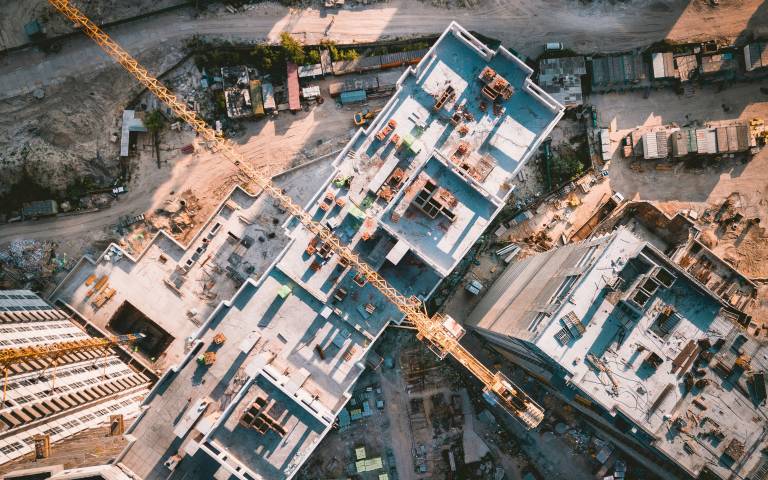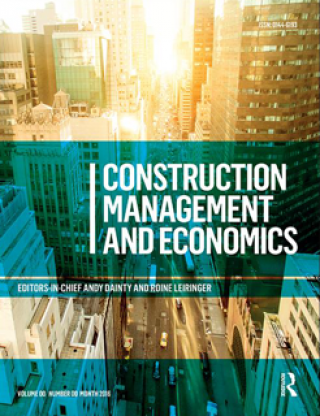Transforming Construction: The multi-scale challenges of changing and innovating in construction
9 June 2020
Bartlett School of Construction and Project Management Professor Jacqueline Glass collaborates with Dr Lena Elisabeth Bygballe and Dr Daniel Hall on a new special issue of Construction Management and Economics journal.

Call for Papers - Overview
Background
Today’s unprecedented rate of global urbanisation and population growth, climate change and pandemics are putting renewed attention on built environments and their development. Rapid transformation of the built environment requires the construction industry to deliver more value, efficiently, safely, and at a higher standard, within the constraints of limited economic, social and natural resources. This comes at a time when the industry struggles to deliver projects on time and budget (Denicol et al., 2020), recruit and retain talent (see Farmer, 2016), and embrace digital transformation (see Whyte, 2019).
Significant external investments and new technologies are emerging rapidly that can deliver novel value propositions for construction clients. Industrialisation and digitalisation of the construction industry threaten to erode the competitive position and viability of incumbents (Gans, 2016; Pullen et al., 2019). A conservative and fragmented construction industry has a reputation for being slow to adopt and integrate new technologies at scale (e.g. Winch, 1998; Slaughter, 2000; Sheffer and Levitt, 2010), resisting attempts to deliver the promises of the fourth industrial revolution.
Construction is nevertheless undergoing a period of transformation with new technologies and delivery models emerging. This changes how construction is conducted, the industry itself, and how we define it. While researchers around the world are exploring the changing construction contexts to address local and global challenges (Jansson et al., 2014; Aitchison, 2018; Bygballe and Swärd, 2019; Pan et al., 2019; Worsnop et al., 2016), the development and application of new theories has been limited (Schweber, 2015). We invite researchers to use this unique moment to revisit the theoretical foundations of construction research, and to develop and apply theories and methodologies that help describe these changes at multiple levels.
Scope
We seek novel conceptual papers, and empirical papers that advance our theoretical understanding of the transformation and industrialisation of the built environment. We want to hear from researchers with perspectives on what is happening, rather than what should happen. Contributions should present descriptive theories that reconcile or bridge theory and practice (see e.g. Turk and Klinc, 2019), ensuring the rigour-relevance balance (Bresnen, 2017), or integrate insights on transformation from other industries and disciplines (e.g. Eklund and Kapoor, 2019). Literature reviews summarising and reconceptualising the challenges of transformation and establishing new research agendas are also welcome (Zhang et al., 2019).
We welcome papers that address the transformation of construction at different scales; for example, how the rise of physical and digital platforms in construction might offer up new ways of conceptualising the products and processes of construction at firm, project and/or industry scale. Papers may take a local, regional or (inter)national view.
Industry Level:
- How do we describe the transformational role of construction’s institutional context (Steinhardt et al., 2019)?
- How can we reconceptualise the industry and its participants to facilitate an understanding of the overarching dynamics of transformation (Dubois and Gadde, 2002; Meacham and Straalen, 2018)?
- How might the concepts of platforms and ecosystems be further leveraged to explain how the construction industry can create and capture value (Gawer and Cusumano, 2014; Jansson et al., 2014; Thomas et al., 2014; Pulkka et al., 2016)?
- How can we better describe the demand side and its influence on industry transformation (Boyd and Chinyio, 2002)?
- What is the role of academics and knowledge transfer in the transformation process (Gann, 2001)?
- How might we integrate non-financial value and the risks of stranded assets in our decision-making to guide the transformation (Bygballe et al., 2013)?
Firm Level:
- How might we conceptualise and predict how the ongoing industrial transformation will shape firms’ business models (Lessing and Brege, 2018; Hall et al., 2020), and perhaps even reframe the notion of the ‘firm’ itself?
- What is the role of new financial players (e.g. venture capital) that aim to invest in disruption of organisations, and how are incumbents responding?
- Can theories be developed to describe how firms can select appropriate value propositions, structures, capabilities and assets in response to the transition (Winch, 1998; McDonald and Gao, 2019)?
- What insights can aid firms to re-configure themselves, their services and processes to make best use of the emergent technologies (Davies et al., 2006)?
- What implications are there for organisational routines (Bygballe and Swärd, 2019)?
- What can theory from other domains tell us about these challenges, and the consequences for firms and their employees (Hall et al., 2020)?
- How can firms identify, implement and scale solutions to address productivity, resource and carbon challenges (Greenwood et al., 2019)?
- Can we describe how the contradictory forces of collaborative working and competitive advantage can be reconciled, enabling a more collective endeavour?
Project and Programme Level:
- What new procurement models might apply to support transformation, and what might this mean for the contractual landscape, warranties, and the future of supply chains?
- What theoretical insights can support supply chain transparency and resilience in uncertain times?
- How do we conceptualise risk and its allocation in a world of collaborative data-driven architecture?
- Can we further develop theories to explain project innovation (Slaughter, 2000), while engaging with the contingent and emergent nature of the multi-party construction project? Or reconceptualise team structures (Levitt, 2012; Hall and Scott, 2019)?
- Can we present theories that describe the influence of the project finance and insurance sectors on projects?
- How can our understanding of technological adoption be structured to better steer project delivery models and support the integration of these more complex systems (Whyte, 2019)?
Full list of references can also be found on the journal's website.
Submission Instructions
Submissions
To express an interest to contribute to the special issue, authors are encouraged to submit extended abstracts no later than 31st August 2020 via the online submission system below.
To ensure that all manuscripts are correctly identified for consideration for this Special Issue, it is important that authors select ‘Special Issue: Transforming Construction’ when uploading the manuscript. Manuscripts should be prepared in accordance with the journal’s instructions for authors link below. All submitted manuscripts will be subject to Journal’s double-blind review process.
Key Dates
- Call opens: June 2020
- Extended abstract submission deadline*: 31st August 2020
- Invitations to produce full papers issued: 30th September 2020
- Full paper submission deadline: 15th January 2021
- Publication of the special issue: January 2022 (accepted articles will appear online ahead of publication)
*Extended abstracts are not essential but encouraged, as this will provide an opportunity for authors to seek feedback from the guest editors and to receive confidence that the paper proposal is within the scope of this call. Abstracts should be no more than 1,000 words in length including references, and should clearly state the research rationale and purpose/aim, the research problem or theoretical question being addressed, the research methods, and an indication of the key findings.
Informal queries regarding this special issue can be directed to Professor Jacqui Glass, j.glass@ucl.ac.uk. For more general queries about Construction Management and Economics, please write to Professor Paul W Chan, p.w.c.chan@tudelft.nl.
Instructions for authors can be found on Construction Management and Economics website.
 Close
Close


